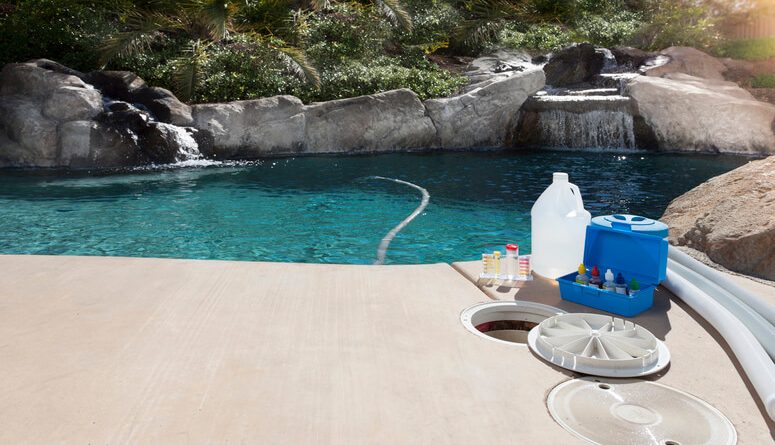The 3 best swimming pool chlorines: How to choose the chlorine best suited to your swimming pool
If this is your first time buying chlorine for your new pool, you may be wondering where to start and how to choose the best sanitizer for your water. Today, we’re going to introduce you to the different types of chlorine that exist on the market, and give you our tips for buying the best possible product, depending on your pool!
Chlorine in all its forms:
To help you buy the best chlorine for your pool, let’s start by showing you the different forms it can come in: liquid, tablet, or powder.
Each has its pros and cons, and you’ll find yourself switching between them throughout the season.
Chlorine powder:
Powdered or granulated chlorine is particularly suitable for shock chlorine treatments. It dissolves quickly in water, which gives it the advantage of spreading and acting very quickly in your pool. The downside is that it tends to disappear just as quickly.
Chlorine tablets:
Chlorine tablets have the great advantage of diffusing slowly into the water (unlike chlorine powder). You can place them directly into your skimmer, or better yet, into a floating diffuser. Since they diffuse slowly, they are much less effective at shocking your pool, but they are still useful for everyday use. And with experience, you will eventually learn how long a tablet lasts before it completely dissolves.
Liquid chlorine:
Liquid chlorine is a rather special case. Although effective, it is generally less concentrated than powdered chlorine or chlorine tablets. It is perfect if you have a chlorine regulator that will take care of diffusing it for you, at the right dose, at the right time. Also, note that liquid chlorine (sodium hypochlorite) is derived from the same active ingredient as bleach! It will also raise the pH of the pool, but if your water is well balanced, it should quickly return to level.
Chlorine gas:
Chlorine exists in gaseous form but is only used by pool professionals. You won’t find it in stores, but at least you know it exists!
Pro Tip: Find the best water purification system in Phoenix, AZ, for clean and safe drinking water. Choose top-rated solutions with expert installation. Get started today!
Choosing the best chlorine for my pool
As you will have understood, the choice of chlorine is very largely dependent on the situation of your pool. Is your water cloudy? Loaded with limescale? Green? Well balanced? The answers to these questions will guide you toward the best choice. However, here are our choices of chlorine, depending on your situation.
The best chlorine for daily use:
Trichloride
The greatest strength of trichlor is its tablet format which allows it to diffuse slowly into the water, unlike dichlor which disappears very quickly from the water after you add it.
In other words, once in a floating diffuser, you can (almost) forget about it and be at peace!
You won’t have to worry about any variation in the hardness of your water either, since unlike calcium hypochlorite, it doesn’t contain…calcium.
The advantages :
- You will not find more concentrated chlorine (approx. 90% active chlorine)
- In tablet form, it diffuses slowly into water
- It is stabilized chlorine, which means it is resistant to sunlight.
The disadvantages:
- With a pH of 3, trichlor will lower the pH level of your pool.
- Trichlor is very acidic (hence its pH level). If you place the trichlor tablets in your skimmer, the acidity will attack your plumbing. This drawback can be circumvented with a floating diffuser, however.
- It will raise the stabilizer level in your water.
Calcium hypochlorite
Calcium hypochlorite is a mixture of bleach and chlorine. It is sold in powder or tablet form and is undoubtedly one of the preferred chlorines of pool owners in France. For daily use, we recommend the powder format.
The advantages:
- A good source of calcium if your water is too soft
- It does not contain a stabilizer
- Very cheap
The disadvantages
- If your water is hard and your pool is suffering from scale, it will only add to the damage.
- It does not resist the sun’s rays.
Unlike trichlor, calcium hypochlorite is not stabilized, meaning it is not resistant to sunlight, but it will not increase the stabilizer level in your water. Use at night to counteract the effects of UV!
Sodium hypochlorite
Sodium hypochlorite is the basis of the famous bleach. It is also the chlorine produced by saltwater pool chlorinators. It must be used in the form of bleach extract or liquid chlorine rather than in the form of bleach. The difference is the concentration rate (3% for bleach versus 12% for bleach extract)
The advantages:
- It acts very quickly in water
- It does not contain a stabilizer
- Very cheap
The disadvantages :
- Its pH is very high (between 12 and 13)
- It does not resist the sun
- It does not keep for more than 3 months.
Sodium hypochlorite is an unstabilized chlorine, so it is best to use it at night. While it will quickly increase the pH of your pool, it should return to normal once it has finished acting. Indeed, if sodium hypochlorite produces hypochlorous acid when in contact with water (which raises the pH), it also produces hydrochloric acid when it oxidizes (which lowers the pH).
The best chlorines for shock treatment
Calcium hypochlorite
In theory, you can shock with any type of chlorine, as long as you add enough. And that last sentence is the one to remember: as long as you add enough.
If you are shocked with stabilized chlorine, the level of cyanuric acid (or stabilizer) will drastically increase in your pool, which eliminates it from the equation almost without any conditions. A shock treatment with sodium hypochlorite on the other hand would require a very high dose of products because of the low concentration level of active chlorine.
This is why calcium hypochlorite is once again the best solution.
This is why calcium hypochlorite has all the necessary assets for a good shock treatment: it has a high level of chlorine (60%), it is non-stabilized and it diffuses quickly in water!
Products to Avoid
Dichlorine and lithium hypochlorite, are the big losers.
Chlorine occurs naturally as a yellow-green gas, although it is more readily available to homeowners in the form of granules or tablets.
Lithium hypochlorite is bleach to which lithium has been added. And that’s its drawback: lithium is a metal that is in high demand by manufacturers. As a result, the price goes up and it is very difficult to find! Dichlorine, however, is still very common! Unfortunately, it is too loaded with a stabilizer compared to trichlorine. As a result, you should only use it if your pool already has a very low level of stabilizer (below 30 ppm, which can be the case when you first fill the pool, for example) since dichlorine will make it rise… skyrocket!
Pro Tip: Get the best water purification system in Glendale, AZ, for pure and safe water. Explore top-rated solutions with expert installation. Contact us today!
The advantages of dichlorine:
- Dichlorine dissolves quickly. It can be poured directly into the pool skimmer, without preparation.
- It is quite resistant to the sun
- It reduces pH very little
The disadvantages of dichlorine:
- It costs more than other chlorines
- It is very loaded with stabilizing
The benefits of lithium hypochlorite
Lithium hypochlorite has almost disappeared from pharmacies due to industrial demand.
- An excellent alternative to lithium hypochlorite for hard pools
- It does not contain a stabilizer
Disadvantages of lithium hypochlorite:
- It is unnecessarily expensive
- It does not resist the sun
- It must be pre-dissolved
- It is almost impossible to find them on the market anymore.
Rent your swimming pool to individuals and make it profitable!
Did you know that your swimming pool could earn you more than $1,200 per month? Discover the trick used by more than 1,600 owners in France to earn money with their swimming pool!
Read Other: Building a Concrete Pool with Your Own Hands



